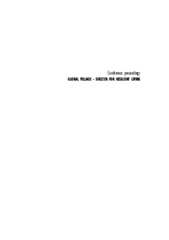Приказ основних података о документу
Coping with Migrants' Flow in Balkans: Case Study of Serbia Resolving Migrants' Housing Problems
| dc.creator | Čolić, Ratka | |
| dc.creator | Mitrović, Biserka | |
| dc.date.accessioned | 2023-11-28T17:50:30Z | |
| dc.date.available | 2023-11-28T17:50:30Z | |
| dc.date.issued | 2021 | |
| dc.identifier.isbn | ISBN 978-86-7924-276-1 | |
| dc.identifier.uri | https://raf.arh.bg.ac.rs/handle/123456789/1718 | |
| dc.description.abstract | This paper presents a case study from Serbia, a local setting that faced a migration crisis in 1990s, that continued at the beginning of the 21st century. The focus is on urban planning, new governance practice and housing solutions as a response to the crisis. Serbia faced problems regarding the influx of migrants - refugees (displaced persons from Croatia, Slovenia, and Bosnia and Hercegovina), internally displaced people (IDPs from Kosovo and Metohija), and immigrants (from another countries), without a ready-to-use policy. The process of political, economic and social transition went hand in hand with the migration crisis. Urban planning practice and housing policy were subsequently affected by these processes. As an EU candidate and a country committed to UN programs, Serbia received support for the socio-economic integration of migrants in several international programs. This paper takes a stock of the 25 years long efforts in implementation of formal urban planning and new governance instruments for housing solutions for migrants in Serbia. The research examines the relationship between national and international programs in the field on one hand, and state-level and local policies and practices on the other. It analyses the legal framework, regulations and norms, and governance practices in the field of housing solutions for migrants. The findings related to the good practice examples are discussed in the context of responsiveness of planning practice and urban governance to migrations in Serbia. | sr |
| dc.language.iso | en | sr |
| dc.publisher | Belgrade : Faculty of Architecture in Belgrade | sr |
| dc.rights | openAccess | sr |
| dc.source | Conference proceedings / [Online international conference] Global village - shelter for resilient living, [9-10th of December 2021.] | sr |
| dc.subject | housing solutions | sr |
| dc.subject | planning and governance instruments | sr |
| dc.subject | post-socialist transition | sr |
| dc.subject | regulation in housing and planning | sr |
| dc.subject | refugees and IDPs | sr |
| dc.title | Coping with Migrants' Flow in Balkans: Case Study of Serbia Resolving Migrants' Housing Problems | sr |
| dc.type | conferenceObject | sr |
| dc.rights.license | ARR | sr |
| dcterms.abstract | Митровић, Бисерка; Чолић, Ратка; | |
| dc.citation.spage | 58 | |
| dc.citation.epage | 64 | |
| dc.identifier.fulltext | http://raf.arh.bg.ac.rs/bitstream/id/6044/bitstream_6044.pdf | |
| dc.identifier.rcub | https://hdl.handle.net/21.15107/rcub_raf_1718 | |
| dc.type.version | publishedVersion | sr |

